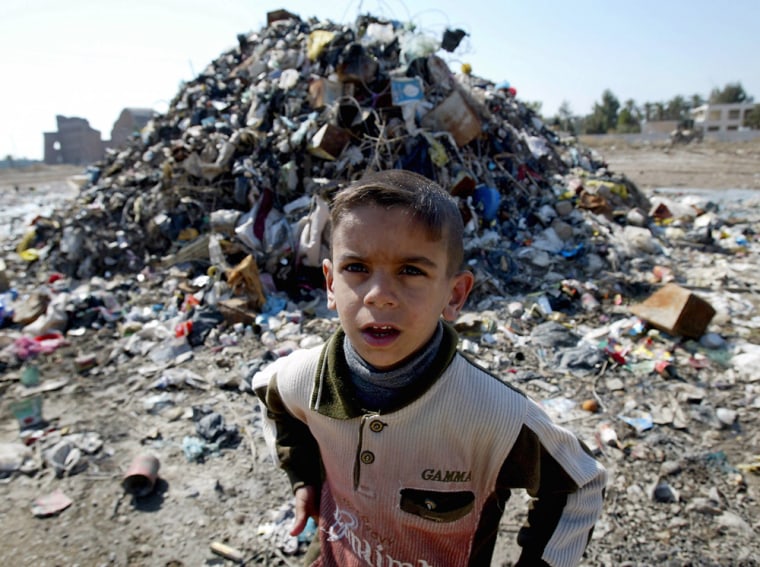Unfortunately, as more foreign fighters enter the city, more (very) well-trained snipers are out and about with devastating effect.
— Excerpt from an e-mail update written by Tom Deierlein on Oct. 20, 2006
Collecting garbage is one of the most dangerous jobs in Baghdad.
Nearly 500 garbage collectors have been killed since the Iraq war began. Many are young. Some are just teenagers.
They don’t empty garbage cans. Instead, they shovel loose trash and debris into garbage trucks. All the unbundled, discarded refuse wreaks havoc on Baghdad’s sewage system, clogging pipes and creating putrid pools of raw sewage on the streets, even in more affluent neighborhoods.
Garbage was one of the most vexing problems facing Capt. Tom Deierlein and his fellow soldiers.
In Adhamiya — a neighborhood that recently made headlines when a U.S. military brigade began building a 3-mile-long concrete wall around it — garbage workers faced such great danger that many wouldn’t go there at all. They could be shot by extremists for uncovering roadside bombs hidden in the piles of garbage, or simply for receiving their paychecks from U.S.-led forces.
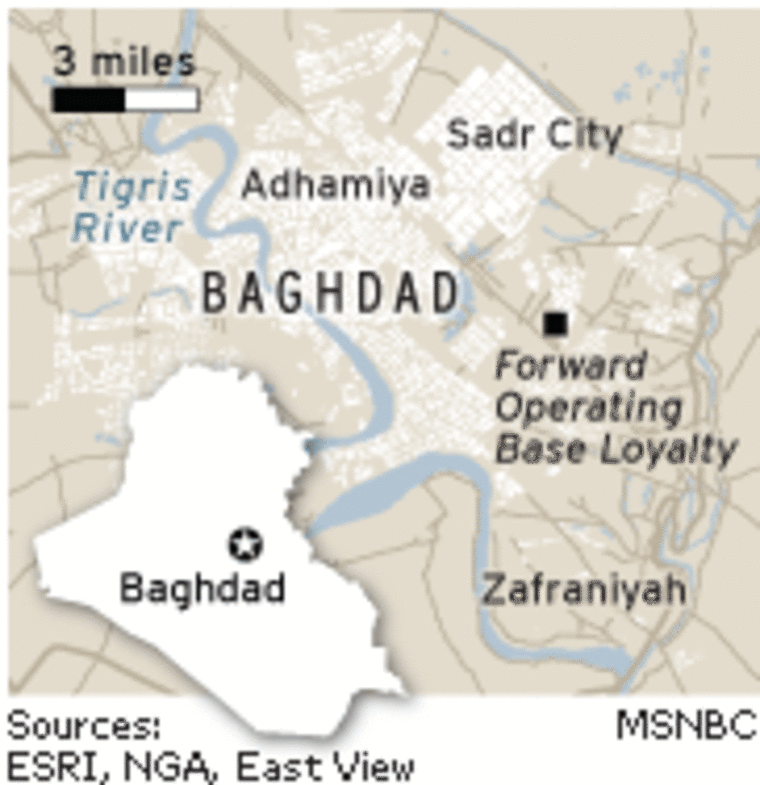
“Garbage was six or seven feet high in some places,” recalled Capt. Drew Corbin, Deierlein’s friend. “It was as if New York had gone on strike.”
The rotting waste presented enormous dangers not just for Iraqi trash collectors and for local residents exposed to the risk of disease, but for U.S. troops. Corbin said many of his unit’s civil affairs missions in Baghdad were connected in some way to the city’s garbage problem.
“If we didn’t pick up the garbage, then al-Qaida would put explosives in the garbage to kill us,” he said. “And if the streets are full of trash, the Iraqi people are going to be upset and blame us. … Everything is linked.”
To get control of the situation in the city’s most volatile areas, U.S. and Iraqi forces began conducting an operation called “Together Forward” in the summer of 2006. In an e-mail message to his friends and family, Deierlein wrote that the effort made him “SO HAPPY.”
“The basic goal was to seal off and rapidly clean up some of the worst hotspots in Baghdad. The 172nd Stryker Brigade would cordon off (seal off) an entire district of Baghdad for two weeks or so and search house by house and building by building to clean out weapons and bad guys. Then we Civil Affairs guys would follow up and work with local government on some rapid/quick-impact projects, medium-term development projects and of course long-term projects like economic development. The main thing was to re-establish security and then turn it over to Iraqi forces to continue enforcement of rule of law. … We had also hired about a dozen contractors to clean up the trash and debris in the streets while we tried to get the local civil servants to fix and restart their trash service. This was a main effort in the new Battle for Baghdad.”
U.S. troops swarmed Adhamiya as part of this operation. They also distributed food bags and water in early September 2006 to poor Sunni families in the area.
Under fire
On Sept. 9, just days after the humanitarian-aid mission in the area, Corbin got word that garbage collectors who dared to enter Adhamiya had come under gunfire. Two workers fled on foot and ran to the local District Council offices, where they found Corbin and frantically asked for help. They left their garbage truck, a bullet-ridden car and their shovels behind when they ran off.
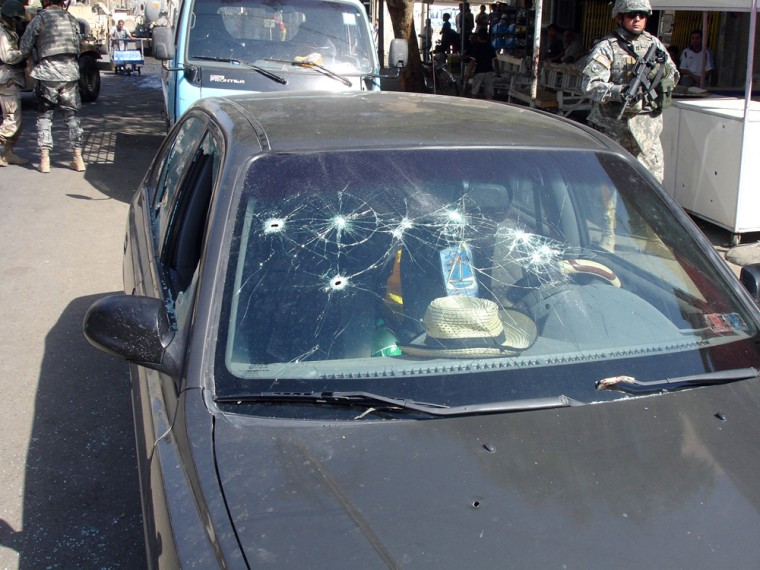
Corbin organized a patrol of more than a dozen soldiers to head out to the scene, collect the abandoned equipment and gather information about the shooters. Deierlein went along in one of the four Humvees to help out.
They didn’t realize they were traveling straight to an especially dangerous street in Adhamiya — a thoroughfare with a heavy al-Qaida presence, Corbin later learned from an intelligence officer. When they arrived, no one would talk to them about the shooting. No one smiled. No children ran up to say hello to the soldiers.
Moments later, Corbin heard a gunshot, followed by a scream. He turned to see Deierlein lying in the street, clutching his weapon, not moving.
A firefighter from Austin, Texas, Corbin knew he had to stay clear-headed. He ordered everyone to toss smoke canisters to obscure the area from the sniper’s view.
“Pop smoke!” he yelled out. “Everyone, pop smoke!”
‘Can you walk at all?’
Corbin hurried over to his wounded friend. Deierlein had a stoic look on his face. At first the expression made Corbin think that maybe Deierlein was just kidding around, the way he always did. Then the expression broke his heart.
“Can you walk at all?” he asked him.
The question surprised Deierlein. He thought he had stepped on a land mine or been cut in half by a roadside bomb.
“As I flew backward and looked down at my boots and legs, they weren’t coming with me as I fell,” Deierlein recalled. “As I hit the ground all I could think was, ‘I guess this is it, I will bleed out within the next 60 seconds or so.’”
He was flooded with relief when he realized that his legs must still be attached if Corbin was asking him whether or not he could walk.
“Hell no!” he answered.
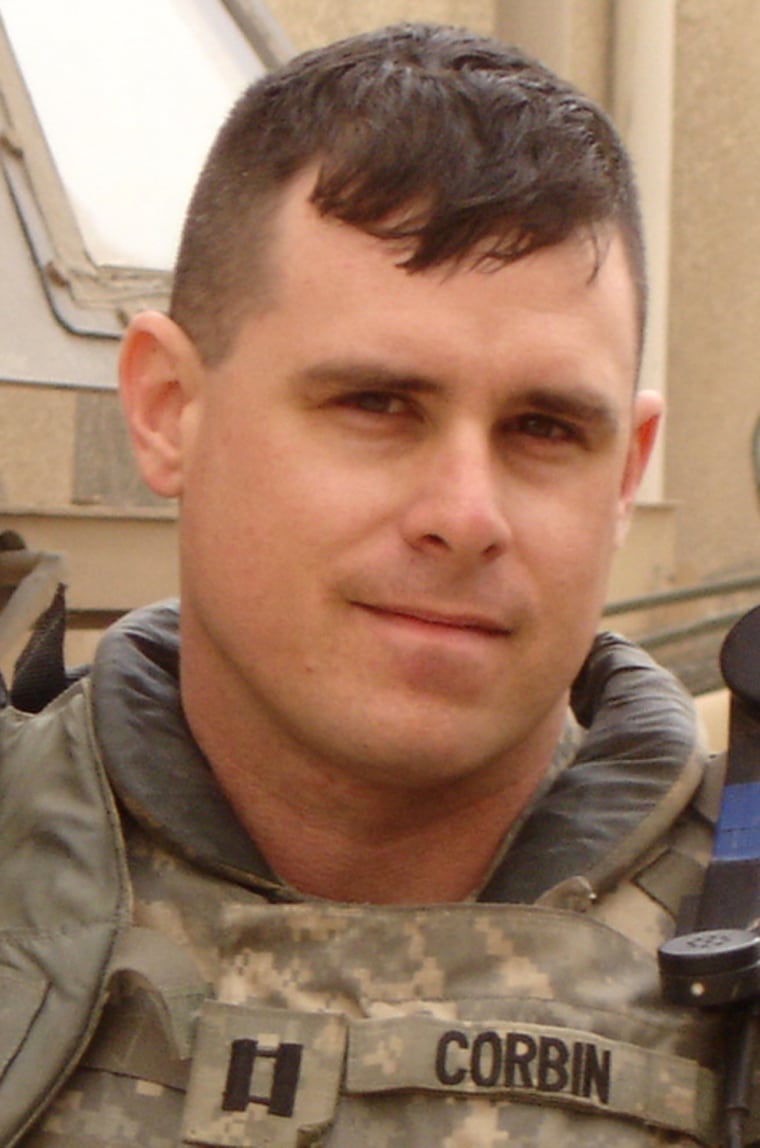
Corbin prepared to drag him over to one of the Humvees. Deierlein told him to hang on a second so he could throw his own smoke grenade.
Then Corbin noticed with some alarm that Deierlein was barely bleeding.
“I’m an EMT for the fire department,” he explained. “I thought, ‘Oh no, he’s bleeding internally.’”
Within seconds Deierlein was in the back of a Humvee, where Sgt. Geof Rogers, a medic, assessed the entrance wound in his left hip and applied pressure. Corbin called ahead to get a MEDEVAC helicopter in position.
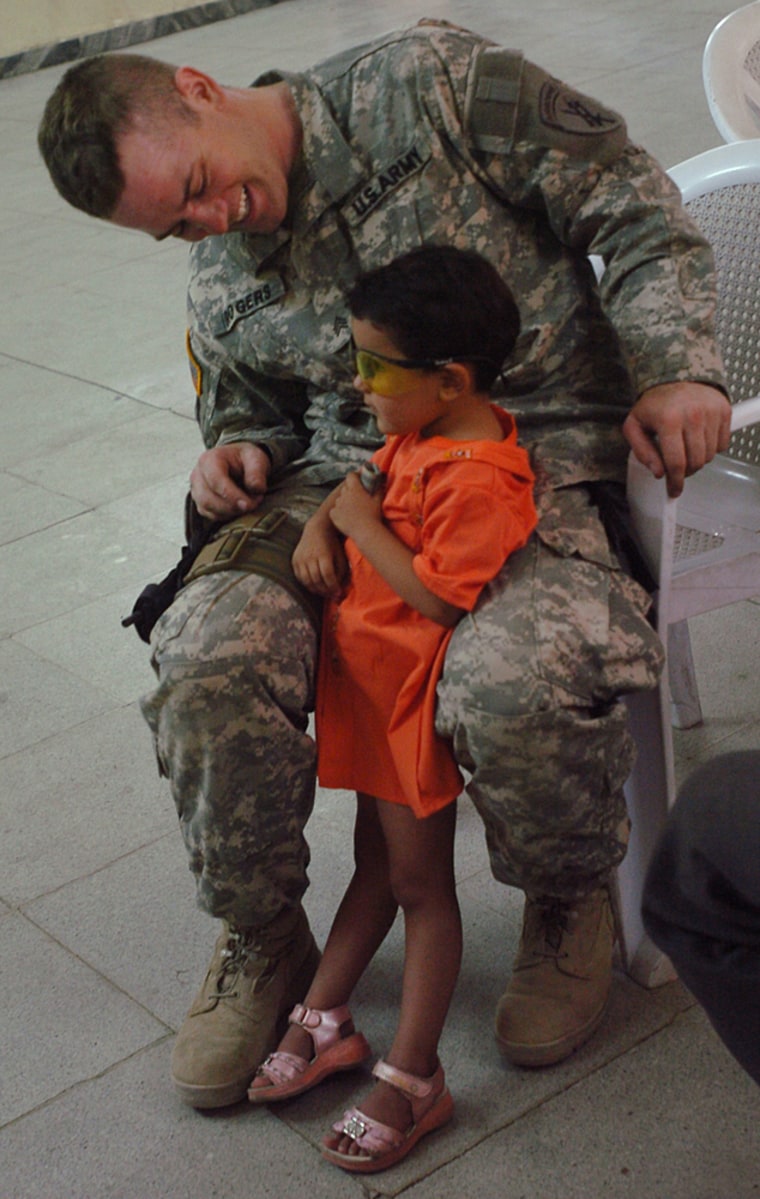
They rushed Deierlein to a medical aid station about 2 miles away. The helicopter picked him up there and brought him to a Baghdad hospital on the west side of the Tigris River.
“From the point he got shot to when he was in the hospital was probably 15 to 20 minutes,” Corbin said, adding that the rapid evacuation probably saved Deierlein’s life. “You’ve heard of the ‘golden hour.’ I don’t think he had an hour.”
Awakened by a phone call
While Deierlein waited for the helicopter to show up, he asked some troops in the aid station to call his wife Hiwot and tell her what had happened. He recited her phone number. Someone dialed the number on a cell phone and placed it in Deierlein’s hand.
“Hello?” Hiwot answered sleepily. It was about 4 or 5 a.m. in Atlanta.
Deierlein asked her whether she’d received a phone call.
“No,” she replied. “Why?”
“I’ve been shot,” Deierlein told her. “They shot me!”
“Are you OK?”
“Yes, I’ll be fine.”
“Are you in pain? Did they give you painkillers?”
“They don’t give painkillers to Rangers.” (Deierlein was high on morphine during the conversation, though it didn’t deaden his sense of humor.)
“Do I need to do anything?” Hiwot asked.
“You have to call my parents. Talk to my dad, not my mom, and you need to downplay it.”
“OK, I’ll tell them it was a BB gun.”
“No, tell them it was a sling shot!”
Going home
Deierlein underwent surgery in the Baghdad hospital. His pelvis and sacrum — the triangular bone at the base of his spine — were shattered by the sniper’s bullet, and his internal bleeding was so severe that he was given 8 pints of blood. The human body contains about 10 pints.
The next day he woke up in a hospital at Balad Air Base north of Baghdad, and the day after that he arrived at a military hospital in Landstuhl, Germany.
On Sept. 11, 2006 — five years after he watched the Twin Towers fall from his office window in Manhattan, and less than two months before the American public would show their opposition to the Iraq war by voting a Democratic majority into Congress — Tom Deierlein was on his way home.
He would walk again months later, but some of his injuries were permanent. The bullet caused nerve damage that will impair his bowel and bladder functions for the rest of his life. He must wear a colostomy bag. Chronic pain may dog him always.
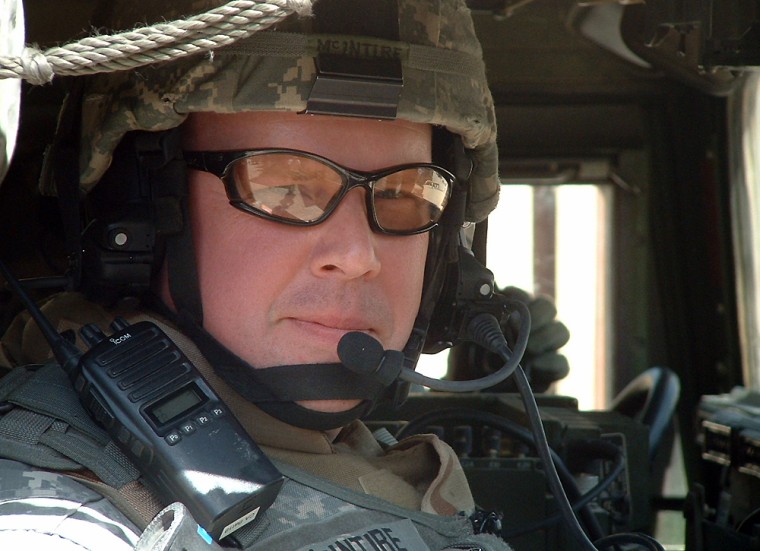
For the friends who remained behind in his civil affairs company, Deierlein’s shooting left a deep well of anger and frustration.
“He gets shot watching garbage contractors,” said Maj. Phil McIntire, Deierlein’s commander. “After that, I got in trouble for turning down missions. I’d say, ‘No, I don’t see a military need for that. We don’t need to be watching garbage.’ It probably wasn’t good for my career, but that’s OK. People’s lives meant more to me than that.”
Corbin in particular felt horrible about the circumstances surrounding the attack by the sniper, who escaped in the chaos after the shooting.
“Sewage and shit,” Corbin said, enunciating the “t.” “Oh my God, no life is worth that. It made me so angry when he got shot. … We spend money to pick up trash and the trash never goes away. It’s never-ending. It’s just pointless to risk someone’s life for that.”
Deierlein’s friends missed him. Mealtimes became awkward and oddly silent. They ceased to be occasions for raucous laughter to release pent-up stress.
The endless games of rock-paper-scissors came to an end. So did the other ongoing and impromptu competitions.
Cigar Night soon fizzled out.
